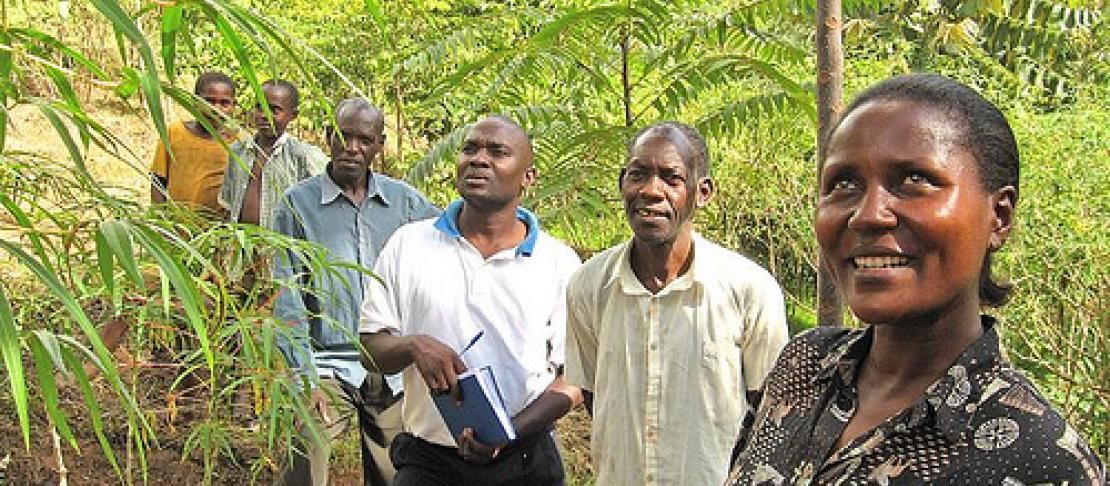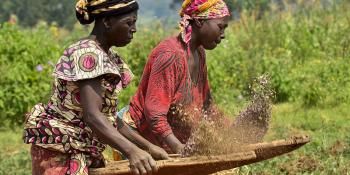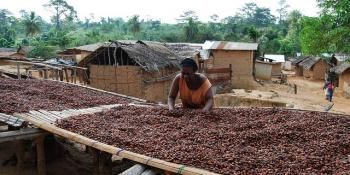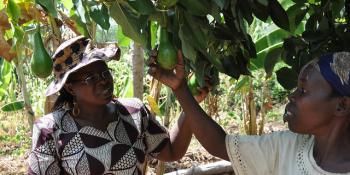Getting African carbon farmers to market

Payments for Environmental Services (or PES) is rapidly emerging as a policy option in Africa to reward farmers who adopt better environmental practises. Under a PES scheme, the beneficiaries or users of environmental services, such as urban water users or international carbon buyers, pay land managers to adopt different farming approaches (such as agroforestry or conservation agriculture). By changing their practises, farmers can contribute to broad environmental goals, and also benefit locally from improved crops and healthier ecosystems, in addition to enhanced income.
The Institutional Analysis and Capacity-Building for Agricultural Carbon Projects in Africa project is managed by EcoAgriculture Partners and Cllmate Change, Agriculture and Food Security programme (CCAFS). The initiative supports developers and managers of agricultural carbon projects in Africa to establish projects that pay farmers for the environmental services they provide, while ensuring that these projects support local sustainable development priorities and are cost-effective.
By engaging with seven existing agricultural carbon projects in Africa, scientists and carbon project managers will assess how these projects organize themselves in order to best serve the interests of farmers.
Real world projects worth examining
The selected projects have diverse characteristics, including geographic location, certification standards and the selected aggregation models. The projects that are participating in this process are also at different stages of implementation. They generally target off-farm rehabilitation, on-farm tree planting, agro-forestry agricultural soil management, Reduced Emissions from Deforestation and forest Degradation (REDD), and reducing other greenhouse gas emissions, such as nitrogen and methane.
- The Humbo Assisted Regeneration Project in Ethiopia will help local community groups receive direct carbon payments, and let them benefit from agro-ecosystem restoration. Humbo is the first large scale African afforestation/reforestation project to be registered under the Clean Development Mechanism (CDM) of the UN Framework Convention on Climate Change (UNFCCC).
- In the International Small Group Tree Planting Programme (TIST) project, farmers plant trees on their farms for different reasons and get paid based on the number of trees planted (and conserved). TIST projects are linked to the broader goal of conservation, ecosystem services and land rehabilitation in India, Kenya, Uganda among other places.
- The Western Kenya Smallholder Agricultural Carbon Finance project, which is funded by the Swedish NGO Swedish Cooperative Centre-Vi-Agroforestry (also known as Vi-Agroforestry), is the most advanced of this kind. The project is mainly promoting the adoption of a wide range of sustainable agricultural land management practices, with added focus on degraded land, and smallholders are expected to access carbon markets and receive additional revenues through the adoption of productivity enhancing practices and technologies. The Vi-Agroforestry Project became the first project to sell soil carbon credits in Africa in November 2010. This project is special in that it will pave way for a new approach to carbon accounting methodologies, and will illustrate concretely how carbon finance can both support the environment and generate incomes for smallholders.
- The Cocoa Carbon Initiative (CCI) Project in western Ghana is working to improve tree cover while enhancing sustainability of cocoa production. By reforesting degraded lands with cocoa, the initiative aims to transform cocoa plantations into full shade systems. This is in addition to conserving the last vestiges of the remaining intact forests. This initiative is beginning to establish how much emission will be reduced through these activities.
- The Nile Basin Reforestation Project in Uganda is also known as the NFA Project, as its main investor is Uganda's National Forest Authority. It is a small scale afforestation/reforestation initiative registered under the UNFCCC’s Clean Development Mechanism (CDM). Funds generated by the project will support the establishment of timber plantations and also flow to target communities. The project supports private and community-based tree planting initiatives, and sharing of payments is based on rigorous verification. The NFA is the main investor, accounting for 85%, while community groups such as the Rwoho Environmental Conservation and Protection Association (RECPA) manages the remaining 15% as co-investors. These community groups will receive payments for each tonne of CO2 sequestered at a price stipulated in the Emission Reductions Purchase Agreement between the buyer and the NFA. They also receive seedlings and technical advice from NFA, and in turn protect the plantations from fire and the remaining patches of natural forests.
- The Trees for Global Benefits Program of EcoTrust Uganda has projects in Uganda and in Tanzania to encourage small landholders to plant trees for carbon sequestration. The projects aim to develop and operationalise a model for carbon trading with smallholders. They will also enhance technical capacity of participating institutions to implement carbon projects.
- Finally, Making Carbon Finance for Sustainable Agriculture Work for the Poor in Western Kenya is run by CARE. This initiative focuses on project design and implementation on a small scale, and has developed a set of supporting activities to address equity issues, and enhance scaling-up. This project includes a learning agenda, and will capture and use knowledge generated by the initiative to support adaptive management as the project is implemented.
Next steps for collaborative research
The EcoAgriculture Partners and CCAFS initiative met with staff from the participating carbon projects in Nairobi from November 3-5 2010, at a workshop to share their experiences. Together, they developed the methodology for fieldwork that will be implemented by researchers in collaboration with the individual project management teams.
The objective of the fieldwork is to understand which institutional structures and operations enable agricultural carbon projects to produce significant carbon offsets at reasonable price with significant benefits for farmers. The results of the fieldwork will help individual projects improve their institutional performance.
In this context, institutional arrangements refer to the policies, structures, rules and regulations that govern project creation and execution. The right institutional arrangements can ensure improved livelihoods participating smallholders and enhanced ecosystems in project areas. When there are institutional gaps, however, projects cannot attain meaningful success. This is a risk for projects involved in Payment of Environmental Services (PES) to smallholders.
Some of the key issues the field research will address are:
- The systems projects use to reduce emission and sequester carbon;
- The organizational structures, roles, linkages and capacities within projects and participating community organizations;
- The financial analysis of projects from the project and farmer perspective.
By building an institutional baseline in 2010, the project will enable comparative analysis across projects and rigorous tracking of institutional changes and impacts over time. If successful, such studies and trainings would be replicated in other parts of Africa and other parts of the world.
This post was written by Seth Shames, Ecoagriculture Partners, and Michael Misiko, from the Climate Change, Agriculture and Food Security programme. For more information about the Institutional Analysis and Capacity-Building for Agricultural Carbon Projects in Africa please sshames [at] ecoagriculture [dot] org (contact Seth).


